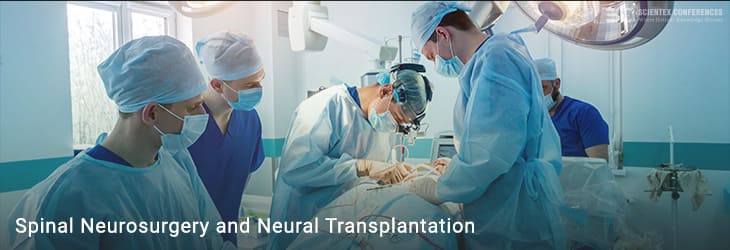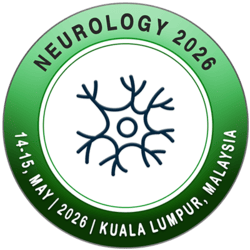Track: Spinal Neurosurgery and Neural Transplantation

Session Overview:
This session will take participants to the cutting edge of spinal neurosurgery and neural transplantation, where groundbreaking research and advanced surgical techniques are revolutionizing patient care. We will explore the latest innovations in minimally invasive procedures, precision-guided surgeries, and neural transplantation technologies, including stem cell therapies and bioengineered tissues. These advancements are offering new possibilities for repairing spinal cord injuries and treating neurodegenerative diseases, providing hope to patients who previously had limited options. Participants will also gain insights into the challenges and ethical considerations of implementing these emerging technologies in clinical practice. By fostering collaboration among neurosurgeons, neurologists, researchers, and biomedical engineers, this session aims to accelerate the development of innovative therapies that improve patient outcomes and quality of life. This is an essential session for anyone involved in spinal care, from surgeons to researchers to healthcare providers.
Recent Developments:
Recent advancements in spinal neurosurgery and neural transplantation are revolutionizing patient care, offering new possibilities for restoring function and improving quality of life. Minimally Invasive Spinal Surgery (MISS), including endoscopic and robotic-assisted procedures, has led to reduced recovery times, greater precision, and shorter hospital stays. The use of 3D-printed custom spinal implants has provided patient-specific solutions that enhance implant stability and minimize complications. Artificial intelligence and machine learning are increasingly applied to preoperative planning, intraoperative guidance, and personalized postoperative care, improving diagnostic accuracy and surgical outcomes. Significant progress has been made in neural stem cell therapy and gene therapy, such as CRISPR-Cas9, for spinal cord repair and neurodegenerative disease treatment. Additionally, bioengineered neural tissues are being developed to support the regeneration of damaged pathways. Advances in neurostimulation devices offer new options for pain management and mobility enhancement, while wearable robotic exoskeletons are helping patients regain independence. These innovations, alongside evolving ethical and regulatory frameworks, are shaping the future of spinal neurosurgery and neural transplantation, promising enhanced outcomes for patients with spinal cord injuries and related conditions.
Sub-Tracks:
Recent Developments:
Recent advancements in spinal neurosurgery and neural transplantation are revolutionizing patient care, offering new possibilities for restoring function and improving quality of life. Minimally Invasive Spinal Surgery (MISS), including endoscopic and robotic-assisted procedures, has led to reduced recovery times, greater precision, and shorter hospital stays. The use of 3D-printed custom spinal implants has provided patient-specific solutions that enhance implant stability and minimize complications. Artificial intelligence and machine learning are increasingly applied to preoperative planning, intraoperative guidance, and personalized postoperative care, improving diagnostic accuracy and surgical outcomes. Significant progress has been made in neural stem cell therapy and gene therapy, such as CRISPR-Cas9, for spinal cord repair and neurodegenerative disease treatment. Additionally, bioengineered neural tissues are being developed to support the regeneration of damaged pathways. Advances in neurostimulation devices offer new options for pain management and mobility enhancement, while wearable robotic exoskeletons are helping patients regain independence. These innovations, alongside evolving ethical and regulatory frameworks, are shaping the future of spinal neurosurgery and neural transplantation, promising enhanced outcomes for patients with spinal cord injuries and related conditions.
Sub-Tracks:
Minimally Invasive Spinal Surgery (MISS)
Focuses on advanced techniques that reduce surgical trauma, enhance precision, and promote quicker recovery.
Neural Stem Cell Therapy
Explores the use of stem cells to repair spinal cord injuries and promote neural regeneration.
Gene Therapy and CRISPR
Investigates genetic interventions to repair or replace damaged spinal cord genes, enhancing recovery prospects.
3D-Printed Spinal Implants
Covers the development and use of custom-designed implants that improve surgical outcomes and patient-specific solutions.
Neurostimulation Devices
Discusses advancements in devices that modulate nerve activity for pain relief and functional recovery.
Bioengineered Neural Tissues
Focuses on creating tissues that mimic natural nerve cells, aiding in spinal cord regeneration.
Robotic-Assisted Spinal Surgery
Examines the integration of robotics in spinal surgeries to increase precision and reduce human error.
Spinal Cord Injury Rehabilitation
Reviews advanced rehabilitation techniques, including robotic exoskeletons, to restore mobility and independence.
Regenerative Medicine and Tissue Engineering
Explores the use of growth factors and scaffolds to stimulate the body’s natural healing processes for spinal injuries.
Ethical and Regulatory Considerations
Addresses the evolving guidelines and policies to ensure safe, effective, and accessible advancements in spinal neurosurgery.
Scientific Highlights
- Neurology
- Neuro Anatomy
- Mental Health and Psychiatry
- Geriatric Neurological Disorders
- Neuromuscular Diseases
- Brain Tumor and Neuro-oncology
- Cerebrovascular and Critical Care Neurology
- Clinical Neurophysiology
- Central Nervous System
- Neuro-Ophthalmology
- Pediatric Neurology
- Neuroimaging and Brain Mapping
- Neurogenetics and Neurodegenerative Disease
- Behavioral and Cognitive Neuroscience
- Neurochemistry and Neuropharmacology
- Spinal Neurosurgery and Neural Transplantation
- Neuro Robotics and Neuro Modulators
- Addiction and Adult Psychology
- Brain Stimulation and Computational Neuroscience
- Neural Control of Micturition
- Parkinson's Disease


